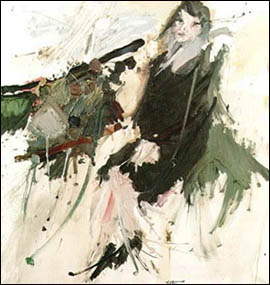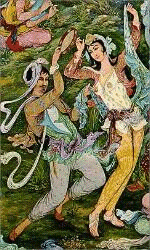
by Sadeq Hedayat
Translated from the Persian
by Farzin Yazdanfar
 |
The night before last, I was there, in that small guest room. Her mother and sister were there, too. Her mother was wearing a gray dress; her sister was dressed in red. Leaning my elbow against the piano, I stood there looking at them. There was no sound, except the sound of the record player; it was playing a sensational, melancholy song called, "The Captains of the River Volga." Outside, the wind was blowing. Rain drops were crashing against the windowpane and gradually sliding down the glass. The monotonous sound of rain drops mixed with the sound of the music.

Madeleine was sitting in front of me. Worried and gloomy, with her head leaning against her hand, she was listening to the music. I was looking furtively at her reddish brown wavy hair, her naked arms, her neck and her lively childish profile. She had assumed an expression which looked unnatural. I always imagined her a girl who would run around, play games and joke all the time. I could not imagine her a person who would think seriously about life. I could not believe that she, too, could become sad. I liked her carefree and childish mood.
This was the third time that I had visited her. The first time I met her, we were on the beach. She and her sister were wearing bathing suits. They looked carefree and were constantly smiling. Madeleine's behavior was that of a child's; she looked like a naughty child with two bright eyes. I remember everything about our first encounter: the sunset, the waves and the casino. But this time, she and her sister had changed a lot. They looked dejected and worried in those fashionable purple dresses, with skirts covering their legs down to their ankles.
The record stopped with a muffled sound like roaring waves in the distance. Her mother was trying to be sociable; she was talking about her daughters' achievements in school. She said, "Madeleine is the best student in her drawing class." Her sister looked at me and winked. I was pretending that I was listening, giving them short thoughtless answers, but I could not focus my attention. I thought about my friendship with them from the first day I saw them. About two months before I saw her for the first time, I had taken a summer vacation and had gone to the beach. I remember that I was with a friend. It was 4 o'clock in the afternoon; the weather was warm and the streets were crowded. We went to Trouville and took the bus in front of the train station. The bus was sliding and rushing forward on the seaside road through the forest, passing by hundreds of cars. The cars were honking theirs horns, making a lot of noise; the air was filled with the smell of oil and gasoline. From time to time, one could see the view of the sea from behind the trees.
Finally, we got off the bus at one of the stations. It was Villerville. We went up and down through the alleys, which had short walls built of stone and clay on both sides. We reached the beach, which was in the shape of Taftoon* bread, built on the high grounds. A casino could be seen in the square in front of the sea, and there were some small houses and villas built halfway up the hill. Down the hill, on the seashore, there was the sandy beach. A little farther away, the waves were rolling on the shore. Little kids, accompanied by their mothers, were playing ball or playing in the mud. A group of men and women were swimming in their tight bathing suits; they were running in and out of the water. Some were sitting or lying in the sun. Old men were lying lazily under the striped umbrellas reading the newspaper and stealthily watching the ladies passing by. With our backs to the sea, we sat on the high wide edge of a dam facing the casino. It was near sunset and the sea water was rising. The waves were crashing on the shore, and the reflection of the fading sunlight was casting serrated triangles on the waves. A big black ship was sailing towards the port of Le Havre through the fog and the steam rising from the sea. The weather was turning cooler and the people who were down on the beach were gradually coming up. I saw my friend getting up to shake the hands of two girls who were approaching us. He introduced me to them. They came and sat next to us on the edge of the dam. Madeleine was holding a ball in her hands and playing with it; she started talking to us as if she had known us for a long time. Sometimes she would get up and play with the ball in her hands. Then she would come back and sit next to us. Once I jokingly pulled the ball out of her hands; she pulled it back towards herself. My hand rubbed against hers; she had warm gentle hands. I was watching her from the corner of my eyes, looking at her breasts, her naked legs, her head and neck. I thought to myself that how nice it would be if I could just lay my head on her chest and sleep there - right on the beach in front of the sea. The sun had set and the pale moonlight had created a familiar atmosphere in that small remote beach, which was located in the outlying part of the town. Suddenly, we heard the sound of dance music from the casino. Madeleine, whose hand was in mine, began singing an American song called, "Mississippi." I pressed her hand. The light coming afar from the ligthouse had created a half-circle on the surface of the water. We could hear the roaring of the waves crashing on the sandy shore. The shadows of people were passing by.
As these images passed before our eyes, Madeleine's mother approached us and sat by the piano. I got out of her way and stood in the corner. I suddenly saw Madeleine getting up to go towards the table. She walked as though she were asleep. She went through the scattered pieces of paper with music notes written on them. She took one of them and came near me. She stood there smiling. Her mother began playing the piano. Madeleine started singing along, whispering the same dance music which I had heard in Villerville. The song was "Mississippi."
Paris, January 5, 1930Translator's Note:

